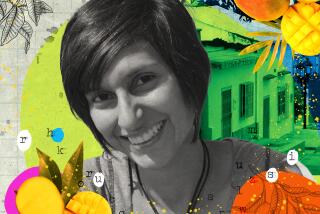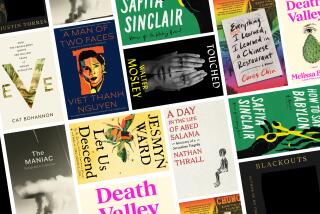Review: Tale of two brothers: One joins the LAPD, the other turns terrorist
- Share via
The first thing author Sunil Dutta describes in his biting new memoir, “Stealing Green Mangoes,” is the reality of trans-generational trauma.
Dutta and his brother, Kaushal, were both born in 1960s India, the children of once-Brahmin Hindu parents who survived the genocidal fury unleashed at India’s independence from the British Raj in 1947. Historians say 14 million people were displaced and more than 1 million were killed during the country’s separation into Hindu India and Muslim Pakistan.
His thought-provoking book asks a central question: How did two brothers — both raised in poverty, abused at home and shaken by the family’s loss of status in a status-obsessed society — take such divergent paths?
Sunil Dutta became a reader, earned a PhD, worked as a research biologist and, in an eventual twist, joined the Los Angeles Police Department.
His brother, Kaushal, nicknamed “Raju,” in contrast, led a life of soulless grift and crime. He became a terrorist.
After he was diagnosed with Stage 4 lung and bone cancer in 2016, Dutta decided to write about his life.
“Everything a human does is connected with his past,” Dutta says in the book’s introduction. “One who lives an examined life reflects, makes connections, and looks for the lessons learned — it is a ceaseless, sleepless quest.”
He lays out in straightforward prose the poverty he experienced as a refugee in Rajasthan; how he obsessively fell in love and married a young American woman named Wes and eventually moved to the United States. Readers learn of his academic pursuits at UC Davis, his interest in mysticism and translating Indian poetry, and eventually his life as a Los Angeles cop.
At 34, his choice to “pick up a gun and strap it on my belt” was “an unlikely decision ... however, somehow it did make sense to me.” Dutta was a patrol officer in the LAPD’s Valley Bureau and then worked as an Internal Affairs investigator during his two-decade career.
He learned the “tools of violence, [so I] could protect and serve the helpless, hopefully without using force or violence,” he said, noting that even Mahatma Gandhi approved of violence in defense of the defenseless. Dutta said that each day as a police officer he did his best to break “the cult of victimhood” rife in criminal gang life.
Juxtaposed with his story are the crime-soaked escapades of his older brother, Raju, whom Sunil remembers with alternating love and intense shame. (The sweet green mangoes he and Raju stole as children from a nearby schoolyard give the book its title.) He recounts that Raju embezzled from a wealthy benefactor, became a fugitive, lived as a terrorist and was convicted of murder. His brother is imprisoned in France.
Throughout the book Sunil broods on why he is obsessed with his brother’s negative path.
Whether it’s Dutta’s inner mystic or the aggrieved street cop inside him, he offers this outlook on a world thrashed with apparent random blessings and curses: “Seemingly hopeless struggles which disadvantaged families face are not the reasons for people to become depraved or warped,” he writes. “Ignorance, prejudice, intolerance, terrorism, religious fanaticism, hatred, conflicts, wars, tides of refugees, and ever-shifting social dynamics of these times make it seem that we have no control over our circumstances. We need to know that we do have a choice in shaping out lives. Our choices matter.”
Sunil Dutta died in May, just five months before his memoir was published.
Stealing Green Mangoes: Two Brothers, Two Fates, One Indian Childhood
Sunil Dutta
Ecco: 256 pages, $26.99
Kinosian is a Southern California journalist and author and longtime Times contributor.
More to Read
Sign up for our Book Club newsletter
Get the latest news, events and more from the Los Angeles Times Book Club, and help us get L.A. reading and talking.
You may occasionally receive promotional content from the Los Angeles Times.






